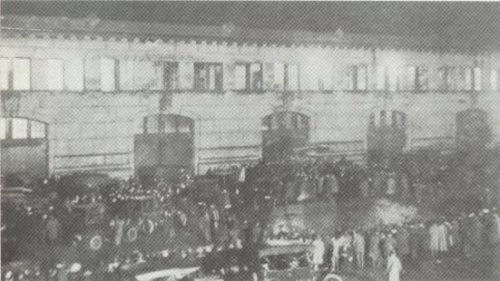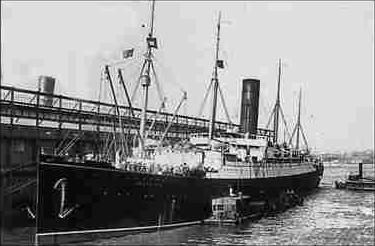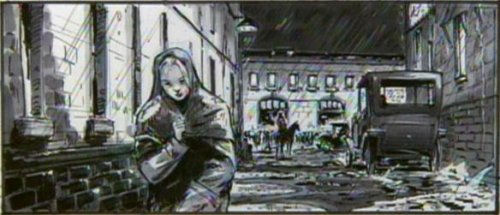THE EDUCATION OF ROSE DAWSON: PART I
Chapter One
Fluctuation


(L) Crowds gathered outside Pier 54 on April 18, 1912; (R) Carpathia
docked at Pier 54
Rose tried to remain
inconspicuous as she disembarked from the Carpathia after it docked at
Pier 54. Despite her disheveled appearance, she was still afraid of being
recognized by Cal, her mother, or another First Class passenger. She
deliberately kept her distance from the First Class crowd by blending into the mass
of Third Class passengers who descended the gangplanks to be met by anxious
relatives, the press, immigration officials, relief workers, and White Star and
Cunard representatives. A few hundred policemen were present to maintain order.
Covering her head even more
firmly with the shawl she was given on the Carpathia, so as to not let
her telltale scarlet locks show, Rose scanned the crowd for any sign of her
mother and Cal while trying to stay out of their sight. It was a tricky
undertaking, but she was fortunate to be among a crowd of Third Class survivors
who were reunited with their relatives and attracted the attention of at least
a dozen reporters and photographers, allowing Rose to walk past this commotion
while politely turning down interview requests from a few reporters and
shielding her face from inquisitive photographers. She estimated the crowd she
saw at around ten thousand.
Among them were some familiar
faces. Madeleine Astor was met by her stepson, Vincent, and his entourage. They
were surrounded by the press as they walked towards their limousine, but Mrs.
Astor was in no mood to talk, especially after losing her husband. Colonel
Archibald Gracie looked the worse for wear, but had some words for the press.
Closer to her, Rose spotted a couple of Third Class passengers whom she had
befriended on the Carpathia–Amy Stanley and Rhoda Abbott. Miss Stanley was on her way to Connecticut. Mrs. Abbott, who had
spent hours exposed to the water before being picked up by Fifth Officer Lowe
onto Lifeboat 14, was the only other woman to have been rescued from the water
alive, but not before losing her two sons to the tender mercies of the
Atlantic. Rose and Miss Stanley did their best to comfort her during the voyage
back to New York, but her feet had been so damaged that she had to be rushed to
a hospital soon after they berthed.
Making friends with Miss Stanley
and Mrs. Abbott helped alleviate some of Rose’s anxiety, depression, and
loneliness during the four days they spent on the Carpathia. But Mrs.
Abbott’s bereavement made Rose think of her own mother’s loss. Is Mother in
the same condition now? It was a thought she tried to suppress in order to
stay hopeful for the future. She was free now, and would not return to her old
life.
Rose saw Miss Stanley and many
other Third Class survivors stopped by government officials and ushered into a
building, and wondered why she was not asked to join them. Perhaps her attire,
despite showing the effects of exposure to the Atlantic and the rain, still
looked respectable enough for her to pass for at least a Second Class survivor,
even though she alighted with the Third Class. It mattered not. As long as the
famous, the families, and the feeble received most of the public’s attention,
Rose could use the opportunity to fade away into the night, and she almost did.
But she was stopped by a voice to her far left that made its presence known. It
had a western tone and was so loud and full of charisma that much of the press
was attracted to it as if its owner were a siren. Where have I heard that
voice before?
"Oh, it was typical Brown
luck…"
"…we’re unsinkable!"
Mrs. Brown!
Rose stopped and slowly, but
discreetly, turned her head in the direction of the voice. It was Mrs. Brown.
She sounded so upbeat in the wake of such a terrible tragedy.
"That’s all for now, folks.
Now, if you’ll excuse me, I have to accompany Mrs. Bukater to her car. She
ain’t feeling well and needs to rest."
Mother?
Rose cautiously maintained her
distance from the throng of reporters and photographers that continued to
follow Mrs. Brown as she reunited with her mother, who, in stark contrast,
looked down and dazed and answered interview requests with a blank stare, as if
her mind was lost on something. She looks just like Mrs. Abbott, except she
was never in the water. The two women were escorted by two chauffeurs to a
couple of limousines waiting outside Pier 54, in one of which Cal was probably
seated. They helped the women board, and then got in and drove off.
As she stood on the street
watching the cars fade into the distance, Rose thought back to her last words
to Ruth: "Good-bye, Mother!" They had come out of her mouth at
a whim, even though she had already planned to run off with Jack once Titanic
docked in New York. Now she wondered if they had come out too quickly. There
would be no wedding, so how would the Bukater Estate manage? Sooner or later
Cal would discover that only the name remained. He may not hold this against
Ruth, but the loss of his bride-to-be was another matter. As far as Cal knew,
not only did Rose go down with Titanic, but before doing so had run off
with a Third Class passenger whom she had just met. That was unacceptable to a
man of Cal’s standing.
Rose recalled his threatening
words to her during breakfast on that fateful Sunday: "I will not be
made out a fool!" In Cal’s eyes that morning, she saw an obsessive
determination to control the opposite sex. His message was clear: this was a
man’s world, and women should know their place. Since he had lost both things
dear to him, would he take his anger out on her mother now that Rose was
believed dead? Ruth would be powerless to stop him.
But perhaps Mrs. Brown was not. Oh,
Mrs. Brown, please do what you can for my mother! I do not think I can face her
again. I only hope I can find a way to contact you in the future so you can
tell me if she is all right. Rose’s eyes began to well up.
Oh, Jack, I wish you were
here. I do not know what to do! In the last week, Rose’s resolve had risen and fallen like a
roller coaster. It was at its nadir when she contemplated suicide at the stern
of Titanic. Then she met Jack and Angus McKenzie, both of whom
demonstrated a faith in her that was missing from most of her First Class
acquaintances. Cal then pulled her back to her world with his violent outburst.
Her mother’s utter fear of ending up as a seamstress made her resigned to being
Cal’s future wife, but Jack’s timely insight–that only she could save
herself–gave her the big push to abandon her old life for good. The first kiss
with Jack on the bow of Titanic, followed by the first time she bared
all for him and the first time they made love, were among the happiest moments
of her life.
Then the iceberg changed
everything–mortally wounding Titanic and shaking Rose back to reality.
Soon after, Jack was torn from her, while Cal’s palm tore across her face. Once
again she was trapped. As Titanic sank, she opted to run back to Jack
not once, but twice–so great was her love for him. Each saved the other’s life
in the catastrophe that slowly, but steadily, crept towards its apocalyptic
climax. Their last moments on Titanic were spent at the same place where
they first met. Then darkness consumed them, and the water separated and
stabbed at them–not like a thousand knives, as Jack had experienced earlier in
his life, but more like a million. Miraculously, they found each other once
more in the water, and were hopeful that the lifeboats would return soon to
rescue them. They believed it was their destiny to remain together forever. But
it was not to be.
As he faded away, Jack made Rose
promise to never let go of that pledge she made–to make the most of her life
until she died an old woman. When he died, a part of her died with him. He was one
of the biggest inspirations in her life, and she had only known him for a
little more than two days. It pained her deeply to let go of his hand after
promising that she would not let go, but she had to do it in order to carry out
her pledge, ironic as it may have seemed. She had been saved too many times by
Jack to give up now. As she passed the Statue of Liberty on the Carpathia,
the resolve returned. Now that she feared for her mother’s well-being, her
heart sank again.
You were right about one
thing, Mother. A woman’s choices are never easy. The tears began to fall again. The pangs
of guilt threatened to crush her fledgling determination once more.
Then Rose remembered Angus
McKenzie’s most introspective words: "Conquer your fears. I know you
can do it." She had only seen Angus for parts of two days, and doubted
that he survived the sinking, given that he was a Third Class male passenger.
But his words lived on.
So Rose pushed back hard. Yes,
I can, she thought as she dried the tears from her eyes. And I will, no
matter how hard it is. I owe it to Jack…and to Mr. McKenzie as well. She
slowly made her way through the crowd and out into anonymity–determined to
fulfill her promise.
*****

Trying to leave it all behind
The rain, which was already
falling when the survivors arrived in New York, continued to soak Rose, who
only had Cal’s jacket and the shawl for protection. To Rose, however, this was
a minor inconvenience, what with her recent experience wading in freezing
saltwater aboard Titanic as it was sinking, and then being momentarily
submerged in the Atlantic itself after Titanic had gone under. She was
fortunate not to have fallen sick during her ordeal, as she had donned the same
set of clothes for five straight days because it was the only set she had.
Through sheer willpower and the rush of adrenaline she developed when helping
others, she was able to stave off any illness. It also helped that the weather
during the journey back was reasonably good until the Carpathia reached
New York, allowing Rose and the handful of survivors who were situated on the
open deck to dry themselves out before the rain came.
Rose did not notice the Heart of
the Ocean in one of the pockets of Cal’s jacket until the Carpathia had
almost docked. Then she discovered something else in one of the inner breast
pockets–something that would help underwrite her new independence–one of the
wads of cash that Cal usually kept in his jackets–and this one contained some
two hundred dollars in tens and twenties bound by a clip. It was actually one
of the lesser amounts that Cal carried around, but for a person of limited
means in 1912, two hundred dollars was a small fortune.
That was what Rose had now
become–a poor girl–to complement the poor guy Jack had been before his demise.
But this poor girl had a sizable amount of money and an incredibly rare and
expensive piece of jewelry in her possession. When she first saw it, Cal told
her it was for royalty. Since then, it had become the centerpiece of a nude
drawing and temporarily immersed in freezing saltwater–two situations in which
its buyer never intended it to serve.
I wish I could return these
items to you, Cal. You
care more about them than you would about anyone besides yourself. But
returning Cal’s belongings was out of the question. Rose could not risk being
discovered to have survived the sinking and then possibly forced back into her
former life. It would be much harder for her to escape it a second time.
Consider this a disengagement
settlement. My disappearance from your life will spare you the shame of having
to remember your actions that night! Do not worry. I will keep this necklace as
a spiritual reminder of the man I truly loved. Go file your claim and find
another woman. Then we can both be happy.
Rose caught a rough reflection of
herself in a puddle formed by the rain. The image was not that of a society
woman who boarded Titanic at Southampton on the morning of April tenth
or even of the one who chose to run off with a Third Class passenger on the
night of April fourteenth. It was that of an ordinary girl who was unsure of
her future. All right, Rose. You want to be poor, but free. Now is your
chance. Are you ready? She looked back at the Pier 54 entrance. There was
still time to turn back and seek help–even find her way back to the world she
had abandoned. Then she turned and looked east. Another world beckoned.
I am Rose Dawson now, not Rose
DeWitt Bukater. There
would be no turning back for Rose. For the second time in five days, she
prepared to cross her personal Rubicon. This one, however, would be done alone.
Rose’s fortitude became as hard
as the diamond. She took a deep breath and produced a faint, but satisfied,
grin.
Cal, I was wrong. You could
not keep us both locked in your safe.